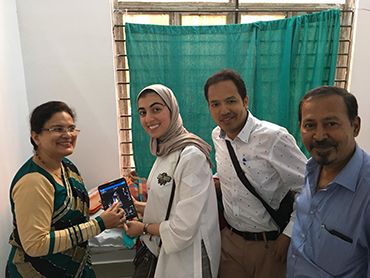Collaborating to improve maternal health
An innovative collaboration between Oxford University and hospitals in India is developing evidence and interventions to reduce maternal mortality.
 Photograph with the hand-held machine: Credit – Project Manager, MaatHRI
Photograph with the hand-held machine: Credit – Project Manager, MaatHRIMaatHRI, which means ‘mother’ in Sanskrit, is an innovative collaboration between Oxford University and hospitals in India, researching maternal mortality and morbidity and developing interventions to improve survival and well-being for mothers and babies.
“India has excellent, world-leading medical facilities and many well-trained staff, but provision is uneven,” explains Principal Investigator, Dr Manisha Nair. “Care in the big cities and southern states is amongst the best in the world, but some of the poorest states lack resources and training and have the worst health outcomes in the country.”
Nair explains how she came to initiate MaatHRI (the Maternal and perinatal Health Research collaboration, India). “I come from Assam in the northeast and trained as a doctor there, coming to Oxford to do a master’s in 2008. I now work as a senior epidemiologist in the National Perinatal Epidemiology Unit (NPEU) in the Nuffield Department of Population Health. Here I have seen what has been achieved through the UK Obstetric Surveillance System (UKOSS) – a hospital-based research coordination platform established at the NPEU. I wondered if it was possible to do something similar in India and worked with contacts in Assam to set up a pilot project.”
The pilot was successfully conducted with two hospitals in 2014-15. The collaboration now includes 15 hospitals, handling more than 100,000 births a year across five Indian states. “The platform allows us to collect data and biological samples to study life-threatening pregnancy complications through large epidemiological studies that would not be possible in individual hospitals,” says Nair.
A significant emphasis of the project is on capacity sharing – supporting researchers to develop research skills (including research design, ethics, and analysis) and to identify and use new interventions and approaches to improve care. The learning is a two-way process: researchers in Oxford are also gaining valuable experience and skills in conducting research in low- and middle-income countries – and the empathy, innovation, and resourcefulness this requires.
One initiative which is particularly close to Nair’s heart, is the use of hand-held echocardiography machines that can help to diagnose or monitor certain heart conditions. “Heart failure is a significant cause of maternal death in India,” she explains. “But we saw that most mothers displaying symptoms didn’t receive heart scans, because the specialists and equipment were not available. We realised we could train obstetricians to use handheld echocardiography machines at the bedside and the images could be interpreted remotely by cardiologists. We’ve now trained 24 obstetricians in 10 hospitals and this has paved the way for testing the use of this simple intervention more widely.”
Results are now coming out of the research studies and the team is starting to write up the findings. One paper examining the differences in blood clotting between pregnant women with and without anaemia has recently been submitted for publication. Another paper describing the vision and methodology underpinning the MaatHRI platform was published in July 2020 on open-access research platform ‘F10000 Research’.
“MaatHRI is the first prototype of a UKOSS-style platform in a low- and middle- income country setting,” says Nair. “It is fostering a new research culture of co-creation of knowledge, and the evidence will also be transferrable to other low-income contexts with high mortality rates. No woman should suffer preventable death or complication in childbirth; this should be a joyful time. MaatHRI is making a small contribution to improving maternal health and survival and we are extremely motivated to continue this work.”
Dr Manisha Nair is Associate Professor, Senior Epidemiologist and MRC Career Development Fellow at the National Perinatal Epidemiology Unit, Nuffield Department of Population Health
Funders: MRC (Career Development Fellowship for Manisha Nair), NDPH (Pump Priming Award), Ultromics Ltd.